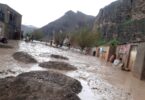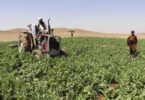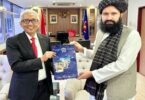KUNDUZ CITY (Pajhwok) Pajhwok Afghan News findings show that a number of cargo vehicles enter northern Kunduz province without paying customs duty, resulting in about 600 million afghanis revenue loss annually.
According to Pajhwok’s findings, vehicles enter Kunduz City through the forest area of Imam Sahib district to escape customs duty before reaching the Sher Khan port. However, the forest area of Imam Sahib district is under the Taliban control. According to Kunduz officials, the Taliban have set up a customs office in the forest area and they take money from vehicles before allowing them to enter the city.
Meanwhile, some other drivers unload their goods and load it into handcarts before reaching Sher Khan port, in order to evade the customs duty. Pajhwok reporter visited Sher Khan port and interviewed some drivers who were trying to smuggle goods into Kunduz without paying customs duties. Elham, one of the drivers, was taking various items in a flying coach vehicle to Kunduz city without paying duty, told Pajhwok that food and non-food items had been entering Kunduz through this route for the past 11 years.
He added: “I have loaded 15 cartons of cacao chocolate, 20 bags of dried tea and 10 bags of wires in my vehicle. I always come this way and I don’t pay customs duty to anyone.” “We take these goods in handcarts and then load them in the truck, the customs officials and the police don’t tell us anything,” he said. Ahmadullah (not real name, another driver, told Pajhwok some drivers used to enter Kunduz through the forest in Imam Sahib district.
He added: “Most of the vehicles come through the forest and other vehicles carry food or other items to Sher Khan port.” He refused further commenting on the issue. Other drivers held similar views but did not provide information directly to Pajhwok.
Taliban set up customs in forest: district chief: NazikmirAkbari, administrative chief for Imam Sahib, told Pajhwok the Taliban had set up a customs office in a forest area, allowing vehicles to escape duties and enter the city. Responding to a question, he replied: “I can’t explain exactly how many vehicles pass through this way every day, but I can say it has affected the customs revenue.”
AmruddinWali, a member of the provincial council, said they had received complaints that some people enter Kunduz without paying the duty. He added: “Entering the city without paying tax is crime. A delegation from Kabul should come and seriously investigate the issue.”
Some goods smuggled into Kunduz: Jamshid Sadat, director of Kunduz customs, told Pajhwok goods entering secretly to Kunduz had negatively affected customs revenue. He said: “Some people smuggle goods and pay the militants and it has negatively impacted our revenue.” According to Sadat, about 50 million afghanis ended up in pockets of smugglers and insurgents every month because of the issue.
He added the customs duty on a tonne is 175,000 afghanis, a tonne of pistachios 43,000 afghanis and a horse customs duty was 80,000-300,000 afghanis. He said the money went into private pockets instead of government treasury and it had affected the revenue. According to Sadat, he has shared the issue with local government officials, which should be addressed soon.
Governor Abdul SatarMirzakwal told Pajhwok he had directed security and intelligence organs to prevent any smuggling or evasion of customs duties. He added: “Both the goods are being smuggled and customs duties are not paid besides there are problems in customs and I’m striving to address them.”
Taliban have not set up customs in forest: On the other hand, ZabihullahMujahid, a Taliban spokesman, told Pajhwok that the movement had not set up any customs office in the Imam Sahib district.
He said the Taliban possessed some highways and only took a certain amount of revenue from vehicles that imported goods into Afghanistan. However, besides Kunduz, similar problems exist in some other provinces as well and some traders enter their goods into cities without paying duty under agreement with the customs and security officials.






